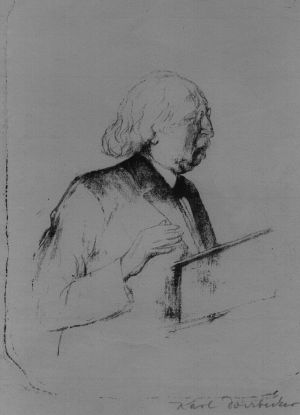Hermann Cohen
Hermann Cohen (July 4, 1842 - April 4, 1918) was a German-Jewish philosopher, one of the founders of the Marburg School of Neo-Kantianism, and he is often held to be "probably the most important Jewish philosopher of the nineteenth century" (Jewish Virtual Library).
Life
Cohen was born in Coswig, Anhalt, Germany. He early began to study philosophy, and soon became known as a profound student of Kant. He was educated at the Gymnasium at Dessau, at the Jewish Theological Seminary of Breslau, and at the universities of Breslau, Berlin, and Halle. In 1873, he became Privatdozent in the philosophical faculty of the University of Marburg, the thesis with which he obtained the venia legendi being Die systematischen Begriffe in Kant's vorkritischen Schriften nach ihrem Verhältniss zum kritischen Idealismus. In 1875, Cohen was elected ao. Professor, and in the following o. Professor (see Professor - Germany), at Marburg.
He was one of the founders of the "Gesellschaft zur Förderung der Wissenschaft des Judenthums", which held its first meeting in Berlin in November 1902.
Works
- "Die Platonische Ideenlehre Psychologisch Entwickelt," in "Zeitschrift für Völkerpsychologie," 1866, iv.
- "Mythologische Vorstellungen von Gott und Seele," ib. 1869
- "Die dichterische Phantasie und der Mechanismus des Bewusstseins," ib.
- "Zur Kontroverse zwischen Trendelenburg und Kuno Fischer," ib. 1871
- Kant's Theorie der Erfahrung, Berlin, 1871; 2d ed., 1885
- "Platon's Ideenlehre und die Mathematik," Marburg, 1878
- Kant's Begründung der Ethik, Berlin, 1877
- Das Prinzip der Infinitesimalmethode und seine Geschichte: ein Kapitel zur Grundlegung der Erkenntnisskritik, Berlin, 1883
- "Von Kant's Einfluss auf die Deutsche Kultur," Berlin, 1883
- Kant's Begründung der Aesthetik, Berlin, 1889
- "Zur Orientirung in den Losen Blättern aus Kant's Nachlass," in "Philosophische Monatshefte," 1890, xx.
- "Leopold Schmidt," in "Neue Jahrbücher für Philologie und Pädagogik," 1896, cliv.
Cohen edited and published Friedrich Albert Lange's final philosophical work (Logische Studien, Leipzig, 1877). Cohen edited and wrote several versions of a long introduction and critical supplement to Lange's Geschichte des Materialismus(2d enlarged edition based on the 7th edition of the original, 1902, I.).
His writings relating more especially to Judaism include several pamphlets, among them "Die Kulturgeschichtliche Bedeutung des Sabbat," 1881; "Ein Bekenntniss in der Judenfrage," Berlin, 1880; as well as the following articles: "Das Problem der Jüdischen Sittenlehre," in the "Monatsschrift," xliii. (1899), pp. 385-400, 433-449; "Liebe und Gerechtigkeit in den Begriffen Gott und Mensch." in "Jahrbuch für Jüdische Geschichte und Litteratur," III. (1900), pp. 75-132; "Autonomie und Freiheit," in the "Gedenkbuch für David Kaufmann," 1900.
Cohen's most famous Jewish works include: Religion der Vernunft aus den Quellen des Judentums (Religion of Reason out of the Sources of Judaism, 1919), Deutschtum und Judentum, Die Naechstenliebe im Talmud, and Die Ethik des Maimonides.
His essay "Die Nächstenliebe im Talmud" was written at the request of the Marburg Königliches Landgericht (3d ed., Marburg, 1888). His last publication was the Logik der Reinen Erkenntniss, comprising the first part of his "System der Philosophie," ix. 520, Berlin, 1902.
External links
- HC Archives at the University of Zurich, Switzerland
- HC website at the Jewish Virtual Library
- Find-A-Grave profile for Hermann Cohen
de:Hermann Cohen
es:Hermann Cohen
fr:Hermann Cohen
it:Hermann Cohen
he:הרמן כהן
nl:Hermann Cohen
ja:ヘルマン・コーエン
no:Hermann Cohen
pl:Herman Cohen
ru:Коген, Герман
sk:Hermann Cohen
tl:Hermann Cohen
Credits
New World Encyclopedia writers and editors rewrote and completed the Wikipedia article in accordance with New World Encyclopedia standards. This article abides by terms of the Creative Commons CC-by-sa 3.0 License (CC-by-sa), which may be used and disseminated with proper attribution. Credit is due under the terms of this license that can reference both the New World Encyclopedia contributors and the selfless volunteer contributors of the Wikimedia Foundation. To cite this article click here for a list of acceptable citing formats.The history of earlier contributions by wikipedians is accessible to researchers here:
The history of this article since it was imported to New World Encyclopedia:
Note: Some restrictions may apply to use of individual images which are separately licensed.
